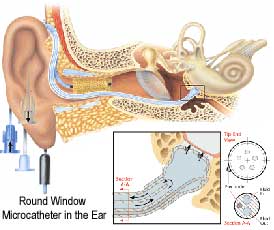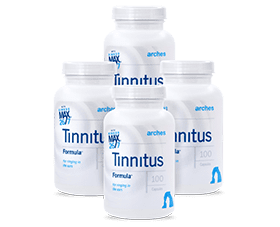by Michael D. Seidman, M.D., FACS
Editor’s note:Dr. Seidman presented this information at the 18th annual meeting of the International Tinnitus Forum on September 23, 2000, chaired by Abraham Shulman, M.D., and Barbara Goldstein, Ph.D. This professional meeting focused on Neuroprotective therapy and drug delivery to the inner ear.
The inner ear is physically, anatomically and chemically isolated from the rest of the body as a means of protecting it from toxins. This isolation has reduced the ability of Otolaryngologists to treat disorders of the inner ear. For the past 50 years, Otolaryngologists have attempted to treat inner ear disorders by using medicines injected through the eardrum, referred to as transtympanic treatment. This treatment method entails a potential risk of damaging the hearing mechanism even to the point of creating permanent hearing loss. Significant improvements have been made in the last decade in delivering medicines to the inner ear in a more controlled method which reduces, but does not eliminate the risk of hearing loss.
Medications that are delivered through the bloodstream typically have significant and sometimes adverse effects on the rest of the body even though they may be helpful for the inner ear. For instance, diuretics are used to help manage Meniere’s disease and reduce fluid volumes in the inner ear. The effect, however, is that there is a significant reduction of fluid in the entire body and only a slight fluid reduction in the inner ear. Some diuretics also lower potassium levels throughout the body. It would be much better to have a diuretic that worked only on the inner ear.
Some medications used for problems unrelated to the ear have significant effects on the inner ear. Aspirin in high doses has been known to cause tinnitus. Certain antibiotics may cause permanent balance disturbances and partial to severe sensorineural hearing loss. The anti-tumor drug cisplatin can cause significant hearing loss. There is a Neuroprotective agent, which will be discussed later, that can protect against hearing loss without reducing the anti-cancer effects of cisplatin.
There are many techniques and drugs used to treat disorders of the inner ear. The three most common techniques in use today are:
- Transtympanic injection using a syringe and a small gauge needle.
- Round window microcatheter – A small catheter surgically implanted under the eardrum which delivers medicine to a small window to the inner ear.
- Silverstein Microwick™ – A small tube with a “wick” through the tube to the round window, allowing the patient to self-medicate.
Antibiotics
For Meniere’s patients, gentamicin (an aminoglycoside antibiotic) is applied directly to the inner ear to partially destroy vestibular function and relieve vertigo. The risk of hearing loss varies from 1-80% but averages 30-40%. The new delivery techniques appear to reduce this risk.
Corticosteroids
Corticosteroids are most commonly used in the management of several inner ear disorders including sudden sensorineural hearing loss, Meniere’s syndrome and disease and autoimmune inner ear disease (the type of hearing loss Rush Limbaugh has). There is some evidence to support the use of steroids, directly applied to the inner ear, for the management of hearing loss, ear fullness and, in some cases, tinnitus.
Lidocaine and Steroids
Lidocaine is a commonly used anesthetic agent. Dexamethasone is a well known steroid molecule possessing potent anti-inflammatory properties. In one study Meniere’s patients were treated with a combination of Lidocaine and dexamethasone by inner ear perfusion. Eighty three percent (83%) of these patients experienced immediate relief from ear fullness and dizziness; 69% of patients had sustained relief after one year. A recent study reported by Shea and Ge indicated that 70% of patients with intractable tinnitus achieved relief from tinnitus within one month of treatment with Lidocaine, dexamethasone and hyaluron perfusion of the inner ear plus intravenous Lidocaine. Tinnitus relief was achieved in 76.9% of patients after three months and 83.3% after one year. The Shea study has come under scrutiny because the patients also received counseling and one or more antidepressants or anti-anxiety drugs which, by themselves, may reduce tinnitus in some people. Therefore, we cannot be certain which of the treatments led to the improvement. Additional study of lidocaine and the combination of lidocaine and dexamethasone seems warranted.
Neuroprotection – Glutamate and Calpain Antagonism
Decreased blood supply causes significant stress to the nerve tissue by causing the production of free radicals. These molecules are extremely damaging and are known to by responsible for over 100 human disorders. The accumulation of free radicals severely damages the inner ear and other tissues. Through a complex chain of events, this damage can then cause a release and accumulation of glutamate and calpains. These chemicals in high concentration are extremely destructive to the body.
Studies have shown that excessive glutamate may play a role in the production of tinnitus. Studies also show that glutamate antagonists can have a protective effect on the inner ear and possibly be a treatment for peripheral tinnitus, that which is generated by the inner ear. Three such drugs are currently under investigation at the Henry Ford Health System for tinnitus: memantine, caroverine and magnesium.
Memantine has been used in Europe for more than 10 years as a treatment for Parkinson’s disease and dementia. Oestreicher et al. (1999) proposed the use of glutamate antagonists, such as memantine, in treating inner ear disorders and recommended that they be delivered locally to the cochlea in order to both maintain an effective therapeutic drug level and avoid systemic side effects. The safety and tolerability of memantine has been clearly demonstrated throughout its use in Germany.
Caroverine has been shown to restrict the activity of glutamate receptors and protect the hearing of guinea pigs. It’s safety and tolerability have been clearly demonstrated in clinical studies. In one study 63% of patients treated with intravenous caroverine reported a significant improvement in their tinnitus immediately after intravenous infusion. Over 48% of patients remained stable after one week. No severe adverse effects were identified for the majority of patients, however a few patients experienced mild transient side effects such as a bad taste in the mouth, headache, vertigo a “hot head” sensation and additional noise. There is, however, conflicting data that suggest placebo effect may have been responsible for tinnitus reduction. More clinical studies need to be conducted to resolve the controversy.
The protective effect of magnesium in preventing noise-induced hearing loss has been studied since magnesium in inner ear fluid decreases significantly after intense noise exposure. The results of one placebo controlled study showed that subjects who took oral magnesium supplements displayed a significantly lower incidence of noise-induced hearing loss compared to the control group. In 1998 a highly motivated patient elected to undergo a catheter-delivered infusion of magnesium sulfate to the round window. Within 60 seconds of the infusion she experienced complete resolution of her tinnitus. This effect lasted until the flow of medicine was discontinued 48 hours later. Unfortunately, she also experienced severe dizziness which went away after reducing the flow rate.
Calpain inhibitors may protect the inner ear from injuries that can lead to noise-induced hearing loss and some types of tinnitus. Chinchillas exposed to noise had significantly reduced hearing loss when Leupeptin, a calpain inhibitor, was continuously delivered directly to the inner ear. Leupeptin treatment has not been attempted to treat noise-induced hearing loss in humans because its long-term safety has not yet been adequately assessed. However, a recent study from our lab and the Martha Entemann Tinnitus Center has clearly shown that leupeptin does not cause hearing loss in animals.
Antioxidants
Antioxidants are a class of medications whose primary action is to scavenge free radicals. Schacht and associates demonstrated the possible relationship of dietary factors and ototoxicity, specifically, a free radical scavenger (glutathione) was shown to reduce Gentamicin-induced hearing loss in guinea pigs. Methionine, an essential amino acid, is a strong antioxidant that provides protection against the ototoxic effects of the cancer drug cisplatin. In one study, both d-methionine and the naturally occurring l-methionine, completely blocked the ototoxic effects of cisplatin for seven days. Grape seed extract and pine bark extract are powerful antioxidants. Preliminary studies are in progress in our lab to understand the effects of grape seed extract on noise-induced and age-related hearing loss.
Neurotrophic Factors
Neurotrophic factors are compounds that support nerve health. They include specific growth factors which are chemicals found in the body that support cell growth. These factors have been shown to aid the regeneration and repair of hair cells in the inner ear of mammals. These compounds may provide therapeutic options for hearing loss and tinnitus.
One study showed that NeuroTrophin-3 and another neurotropic factor provide significant protection from noise trauma when infused into the inner ear of guinea pigs. Another study concluded that when a gene for BDNF (brain-derived neurotropic factor) was introduced into the cochlear-damaged inner ears of mice, it prevented cochlear nerve degeneration.
New compounds or currently existing medications may play a pivotal role in tinnitus management once an obvious mechanism for tinnitus can be identified. It should be remembered that perfusion treatment presumes a dysfunction of the ear itself. It is entirely possible that many forms of tinnitus are brain-related (central tinnitus) and would not respond to treatment aimed at the ear. It is also possible that through brain imaging techniques such as SPECT and PET, we may one day be able to precisely identify the tinnitus site of origin in the brain then inhibit that precise area and eliminate tinnitus.
Get Free Shipping!
Order now and get free shipping on either the Tinnitus Starter Kit or Combo Pack. Try the doctor recommended products with clinically proven ingredients for tinnitus. No coupon code required.

